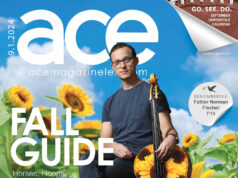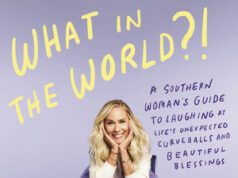Buddy and Julie Miller leave Dogtown for the road
By Kara Fitzgerald
Gurf Morlix says that Julie Miller writes songs that make people weep openly.
“Not everyone can do that,” he said, “She’s found a calling.”
Morlix, who was Lucinda Williams’ collaborator for over a decade and who is a long time friend of Julie’s, isn’t the only one touched by her angelic voice and beautiful lyrics.
“She does it to me too,” says husband and collaborator Buddy.
While they have separate solo careers, they contribute to each other’s projects, and when they sing together are reminiscent of a young Emmylou Harris and Gram Parsons circa 1970.
The couple moved to Nashville in 1993 and with the help of their high profile friends (like Shawn Colvin, Steve Earle, Lucinda Williams, Emmylou Harris, and Jim Lauderdale) created quite a buzz in Music City.
“I was out on that Emmylou/Linda Ronstadt tour for awhile and we were playing with Steve Earle, both Julie and me, opening for him and I just produced the new Jimmie Dale Gilmore record, so I’m extremely busy when I’m in town, which is good-busy’s good,” Buddy admits, catching his breath.
“It’s been interesting, but that just makes it harder to work on our own material. I still play with Emmylou and that’s a gig I don’t really want to [give up], that’s maybe the most fulfilling thing I do musically, certainly as a guitar player.
“I went from Jim [Lauderdale] to making my first Hightone record to auditioning and playing for Emmylou.”
The Millers have also teamed up with like-minded spirits, Victoria Williams, Mark Olson and Jim Lauderdale as “The Rolling Creek Dippers” in previous years, touring Europe and the states.
Everything old…
According to Steve Earle, Buddy is steeped in country music and knows every
country song ever written, as well as every R&B song. He says that “Buddy’s got a real thing about Ralph [Stanley]. He equates Ralph Stanley with Ray Charles. That’s a real insight into Buddy and the way he thinks about music.”
Earle told No Depression that Buddy Miller might be the best country singer working today. He goes on to say, “It’s one of my main barometers for how fucked-up mainstream country music is right now that Buddy Miller’s not automatically on country radio. It just amazes me.”
“I gravitate towards old, old, old stuff like Alan Lomax field recordings or the Smithsonian set or old Webb Pierce records or stuff from the 40s and 50s,” Buddy admits, rummaging through his collection.”Julie doesn’t listen to too much music…When she does, it’s something more along the lines of Social Distortion.
“Well, I like newer stuff and he likes stuff that is a little more grown up,” Julie agrees.
Their diversity often pushes their collaborative and solo efforts in unexpected directions.
“Buddy says that I push him, and I think that’s probably true…but I’m kind of the wilder one.”
Buddy agrees, adding,”Yeah…we kind of have a vague idea and then see where the music takes us.”
“I [have] a lot of influences,” Julie elaborates. “I started in Austin in the 70s…I’m going to call it ‘hippie country’… and I listened to Ralph Stanley and Muddy Waters and then I got into the Pogues, and so I [have] a conglomeration… But [my music], is a stew of rock and country and blues and punk rock and everything else in between.”
“She doesn’t want anything remotely country on her records,” swears Buddy, “On her first Hightone record I put a fiddle on a song and I’m still not hearing the end of that.”
“That was the last fiddle for Julie,” says Julie, raising her voice slightly to get the point across, “It’s so funny, it really did [work], it’s just kind of a little funny thing between us. He loves the fiddle. I sort of think, ‘Okay, well if it has to be something like a fiddle, let’s go with a hurdy-gurdy.'”
“Yeah, she never lets me forget about that fiddle,” sighs Buddy. “Although she’s a great country writer… she just doesn’t want that element of the music in her records, so we definitely have two different sounds.”
Buddy says that his music is one thing and Julie’s is definitely a different thing, but their collaborations are a third entity entirely.
“I don’t know how else to describe it. The harmony… it’s not really falling into either camp. I’m hoping to get to [this duet album] in July. I can’t wait to get going on it,” says an enthusiastic Buddy.
“It’s kind of been a vision of Buddy’s, so I’ve been thinking it may be pretty old-timey, corny, hokey country… ‘anti-cool’,” says Julie, barely containing her laughter.
“You know, as a hippie, I thought I’ll always be playing music, this is all I’m ever going to do,” Buddy says. “I worked building roof tresses for awhile and doing other things back when I was a teenager, but pretty much all I know is this, so I’ll be in trouble when it’s time to move on.”
Julie echoes his sentiment, “I’d always hoped to be able to do this for a living, but you kind of go through different phases over your life. You hope for this, then you [think], ‘Oh, I just hope I can not work at McDonald’s,’ so I’m super grateful to be able to do it and to make a living,” says Julie.
The Millers play Lynagh’s, April 8, 2000 their first Lexington appearance since September of 97. Tickets are $6 in advance, $8 at the door. 255-6614.
DOGtown?
The Millers record all their music in their Victorian home on Nashville’s east side in their home studio, dubbed Dogtown.
When Julie was recording her first record and living near San Francisco, in Oakland actually, she discovered a funky little neighborhood called Dogtown and the name stuck with her.
“I don’t know why we call it that-we don’t have any dogs, we have cats…” Buddy says as he pauses to remove a set of claws from his back.
Of the setup, Buddy says, “We make our records at our house and maybe that contributes a little bit to the whole feeling of it, but I don’t really know.”
“I can’t relate to the pay-by-the-hour thing anymore,” Julie says, “it’s so wonderful to have it at home because you can just grab it when you feel the creative wave coming through.”







